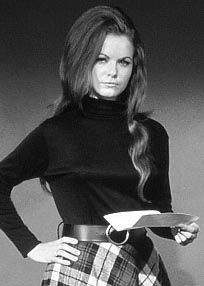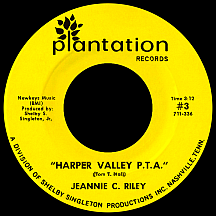JEANNIE C. RILEY
Harper Valley P.T.A.
By 1968, Tom T. Hall had been established for several years, having written hit songs for Jimmy Newman and Dave Dudley in addition to the patriotic "Hello Vietnam," a number one country hit for Johnny Wright in '65. Hall had also penned his first release as a singer, "I Washed My Face in the Morning Dew," in '67. The idea for his most famous composition came as he was reminiscing about his childhood in Carter County, Kentucky, recalling a situation where the mother of one of his schoolmates had been called out by members of the Parent-Teacher Association for her alledged loose morals. In the song, fictional mom Stella Johnson received an inappropriately-worded letter reprimanding her for such: 'Mrs. Johnson, you're wearin' your dresses way too high...it's reported you've been drinkin' and-a runnin' 'round with men and goin' wild...and we don't believe you oughta be a-bringin' up your little girl this way...and it was signed by the secretary, Harper Valley P.T.A.' Thus began the novelty country hit that dared to confront the sensitive topic of sexist attitudes and double standards.
The lyrics continued with Mrs. Johnson wearing her miniskirt to a P.T.A. meeting, proceeding to admonish its members for their own adulterous, liquor-fueled ways: '...you have the nerve to tell me you think that as a mother I'm not fit...well this is just a little Peyton Place and you're all Harper Valley hypocrites!' The song, told from her teenage daughter's point of view, ends with '...it really did, it happened just this way...the day my mama socked it to the Harper Valley P.T.A.,' borrowing a slang term popular at the time. Used in Aretha Franklin's chart-topping 1967 hit "Respect" (but not in Otis Redding's original from '65), "Sock it to me!" became a national buzz-phrase when Judy Carne comically spoke the line each week on Rowan and Martin's Laugh-In, which premiered as a special on NBC in September 1967 and soon afterwards became TV's number one rated series.
Baltimore-based singer Bobbi Martin was the first to record "Harper Valley P.T.A." in the spring of 1968. Country hitmaker Margie Singleton cut a version under the title "(When Mama Socked it to the) Harper Valley P.T.A.," produced by Leon Ashley for his own Ashley label. Margie's ex-husband Shelby S. Singleton became aware of Hall's song but felt it needed a singer with a spunkier attitude than these early versions. Enter Texan Jeanne Carolyn Stephenson, whose first single, "You Write the Music," had been issued on the Little Darlin' label the previous year under the name Jean Riley. Shelby liked the 22-year-old singer's sound and produced her recording of "Harper Valley" for Plantation, a new label he'd started, while giving her a catchier moniker, Jeannie C. Riley. All three singles were released in August and the rush was on for what certainly seemed a sure-fire hit; Bobbi's record managed a showing on Billboard's "Bubbling Under" chart, but Jeannie's was the one that caught on and rose quickly, hitting number one within a few weeks on both pop and country charts, making her the first solo female singer to achieve this feat (previously, the closest anyone had come was Margaret Whiting, who'd pulled off a dual-chart-topper in 1949 with "Slippin' Around," a duet with Jimmy Wakely).
Almost immediately, follow-ups and parodies hit the market. Dee Mullins had a brief chart run with "The Continuing Story of Harper Valley P.T.A.," produced by Shelby Singleton and released on another of his labels, SSS International; the song suggested the P.T.A. members had cleaned up their act (and formed a branch of Alcoholics Anonymous!) as a result of Mrs. Johnson's confrontation, a rather optimistic outcome. Sheb Wooley, using his intoxicated alter ego Ben Colder, came up with "Harper Valley P.T.A. (Later That Same Day)," a drunken rant typical of his many recordings; it too hit the charts. R&B singer-comedian Effie Smith did a spoken routine (similar to her hit "Dial That Telephone") titled "Harper Valley P.T.A. Gossip" and Mike Post released an instrumental version. Then there were dozens of covers, most of them near-carbon copies of the Riley disc; pop acts like The Lettermen and The Billy Vaughn Singers and many country artists jumped on the bandwagon including Billie Jo Spears, Nat Stuckey, Dottie West, Jeannie Seely and even Dolly Parton. In addition, Singleton produced an unrelated project for Plantation, "Downtown Burbank" (penned by Hall), by a country group called The Harper Valley P.T.A., seemingly to cash in further, an attempt that didn't work.

For Jeannie, it was an "overnight success" of sorts, though her image underwent a change; for awhile she was perceived as the hit song's feminist-with-loose-morals protagonist (despite her role in the song as the daughter) so she played it up when making public appearances, wearing miniskirts to fit the description. What could have been a one-hit-wonder situation actually kicked off a string of country hits. "The Girl Most Likely," addressing the issue of being judged by looks or lack of status, reached the country top ten near the end of the year; it was written by Margaret Lewis and Mira Smith, who collaborated on several of Jeannie's other hits including her third top ten, "There Never Was a Time," a detailed story of love persevering through hardships.
Awards recognition came quickly; "HVPTA" won the Country Music Association award for Single of the Year in November 1968 at the CMA's second yearly event (the first to be televised). The Grammys were handed out in March of '69 and Jeannie picked up the coveted trophy for Best Country Solo Performance, Female, besting four other emerging stars (Lynn Anderson, Jan Howard, Dottie West and bookend winner Tammy Wynette, victorious in the category the previous year and the year after). In addition, there were nominations for Record of the Year, Song of the Year and Country Song of the Year, while Jeannie made the cut in the wide-variety Best New Artist category, competing with Cream, Gary Puckett and the Union Gap, O.C. Smith and winner Jose Feliciano. A year later, "The Back Side of Dallas" garnered her a second Grammy nomination in the Country Solo Female category.
Over the next few years she enjoyed nearly two dozen country hits including Lewis-Smith songs "Country Girl" in 1970 and "Oh, Singer" in '71. Becki Bluefield and Naomi Martin counted themselves among several women who contributed compositions to Jeannie's catalog. "Good Enough to Be Your Wife" (penned by Ralph Murphy) became her sixth country top ten in '71. After leaving Plantation, she had several top sellers on MGM including a remake of Don Gibson's late '50s tune "Give Myself a Party" and "Good Morning Country Rain" by up-and-coming composer and eventual country superstar Eddy Raven. In the late '70s, Jeannie made some of her earliest spiritual recordings with The Red River Symphony. A brief stint at Warner Bros. Records in '76 reteamed her with producer Singleton.
But the first-strike phenomenon hadn't yet run its course. In the summer of 1978, former I Dream of Jeannie star Barbara Eden led an all-star cast of comedic actors in a Harper Valley P.T.A. movie that gained a cult following and led to a series on NBC in 1981, also starring Eden, under the original title in season one and a shortened title, Harper Valley, in season two. Around this time, Jeannie published an autobiography she'd written with the help of writer Jamie Buckingham, From Harper Valley to the Mountaintop. As for Tom T. Hall, his belated singing career kicked into high gear in the 1970s and he was one of that decade's most popular country acts, racking up dozens of hit singles through the mid-'80s, including six number one country chart-toppers, the best-known a major pop and country hit in 1974: "I Love." Overall, "Harper Valley P.T.A." was his, and Jeannie C. Riley's, most successful creation. In 1984, he penned one final sequel for her; "Return to Harper Valley" went beyond the original, supposedly repentant townsfolk, to focus on their offspring, a number of new "hypocritical" residents in the town, and the scandalous goings-on that made those '60s folks seem pretty harmless in comparison!


